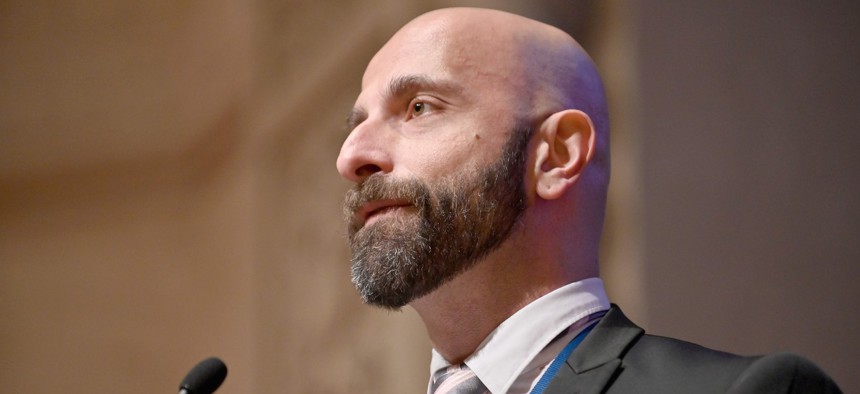
Dr. Demetre Daskalakis, shown here in December 2019, is the deputy coordinator for monkeypox response. Gary Gershoff/Getty Images for Housing Works file photo
FEMA and CDC Officials Will Lead the Monkeypox Response
The Biden administration has not declared monkeypox a national public health emergency yet.
President Biden announced on Tuesday a team to lead the response to the monkeypox outbreak as cases are rising and states and cities have been declaring their own emergencies.
Robert Fenton, a regional administrator for the Federal Emergency Management Agency, will serve as the White House national monkeypox response coordinator, and Dr. Demetre Daskalakis, director of the Centers for Disease Control and Prevention's division of HIV prevention, will serve as the deputy coordinator.
This will mark the first time there are specific leaders focused on monkeypox. So far there have been officials from the Health and Human Services Department, CDC and other federal agencies involved in the response, along with Dr. Ashish Jha, White House COVID-19 response coordinator, but they are not dedicated just to monkeypox. The White House has been looking for a monkeypox coordinator in order “to manage an increasingly sprawling response,” according to recent reporting from The Washington Post.
“Fenton and Daskalakis combined have over four decades of experience in federal emergency response and public health leadership, including overseeing the operations and implementation of key components of the Biden administration’s response to the COVID-19 pandemic, and leading local and federal public health emergency efforts such as infectious disease control and HIV prevention,” said an announcement from the White House.
They will be in charge of coordinating and managing the response efforts across the federal government as well as working with international, national, state and local stakeholders to track and combat the outbreak, which started in May. For state and local partners specifically, they will “ensure they have adequate supplies to test, treat and vaccinate at-risk individuals, [and work] with clinicians and providers on available testing, treatment and vaccination options, and with stakeholder communities on building public understanding of the virus and how to address it most effectively.”
This comes as pressure is building on the Biden administration to make more vaccines available as cases increase and declare monkeypox a national public emergency. As of Tuesday morning, California, Illinois, New York (state), New York City and San Francisco have declared their own public health emergencies.
Rep. Carolyn Maloney, D-N.Y., chair of the House Oversight and Reform Committee, who is among the lawmakers from the president’s party calling for the national declaration, wrote in a letter to HHS Secretary Xavier Becerra on Friday that declaring a public health emergency would allow the department “to access crucial emergency funds to empower a more robust response at every level of government.” Also, “as secretary, you will be granted the authority to make emergency appointments so that your department has the personnel necessary for every aspect of the response and empowered to take additional crucial actions to expand access to preventive resources and treatment for monkeypox patients across the country.”
When asked during the briefing on Monday if the administration supports local municipalities issuing their own emergencies, White House Press Secretary Karine Jean-Pierre said: “We see that as their own decisions to make. Clearly, it's a local jurisdiction.” She added that of the 786,000 additional vaccine doses that were announced last week, 737,000 were being shipped out at the time.
Then when asked for how the president feels about the declaration of a national public health emergency for monkeypox, Jean-Pierre said the decision is up to HHS. “But, as you know, we are considering every policy option to help end this outbreak,” she continued. “That is urgent, and that is important to us. But again, that is up to Secretary Becerra to make that decision.”
The World Health Organization declared a global health emergency for monkeypox a little over a week ago.
In letters to the Homeland Security Department and Government Accountability Office on Monday, Reps. Bennie Thompson, D-Miss., chair of the House Homeland Security Committee; Ritchie Torres, D-N.Y., vice chair of the committee; and Val Demings, D-Fla., chair of the committee’s panel on Emergency Preparedness, Response and Recovery inquired if the federal government has been applying lessons learned from the COVID-19 pandemic response to the monkeypox response, among other questions.
“When there is an infectious disease outbreak, the federal government has an obligation to make vaccines, therapeutics, and diagnostics widely available without undue delay,” the lawmakers wrote to GAO. “We are concerned that the pace of the federal response to monkeypox has enabled the virus to spread for two months and delays in distributing tests and vaccines have harmed efforts to contain the virus. Indeed, even though the United States had at its disposal more than a million doses of the Jynneos vaccine—in a plant in Denmark—it took two months to approve the distribution of those doses, allowing the virus to begin to entrench itself as a rapidly spreading rare disease in the interim.”
The lawmakers set an August 15 deadline for DHS to respond. DHS says they respond to congressional inquiries through official channels.
Charles Young, managing director of public affairs at GAO, said GAO received the request, which is now going through their standard review process.
Update: This article has been updated with DHS's response.







